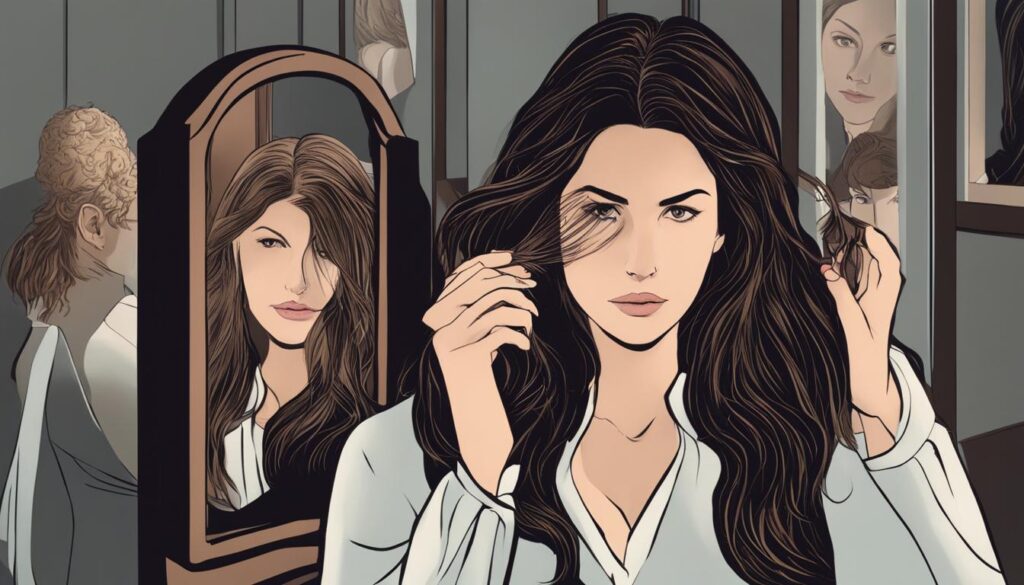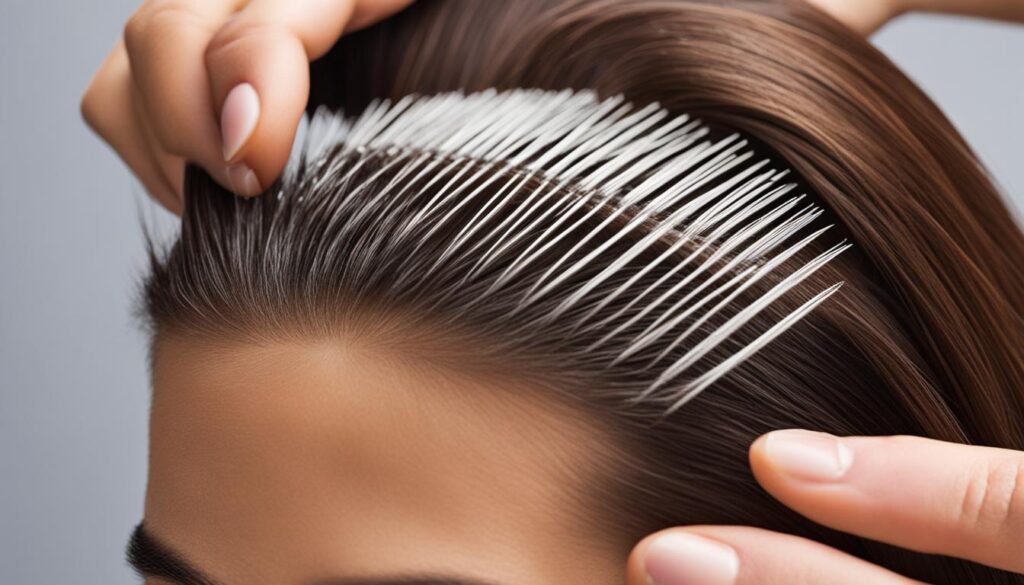Hey there, it’s me again! Today, I want to talk to you about a topic that’s close to my heart: hair loss from anorexia. Having experienced it firsthand, I understand the distress it can cause. But fear not! I’m here to share my personal tips on how to stop hair loss from anorexia and promote hair regrowth. So, let’s dive right in!
When it comes to combating hair loss, one of the key factors to consider is nutrition. Proper nourishment plays a vital role in hair health. By incorporating the right nutrients into your diet, you can significantly improve your hair’s condition and boost regrowth. I’ll be sharing some nutritional remedies that have worked wonders for me.
But that’s not all! I’ll also be discussing coping strategies to help you navigate the emotional impact of hair loss. Acceptance and seeking support are essential steps in your recovery journey. Don’t worry; you’re not alone in this. We’ll conquer it together!
Furthermore, I’ll shed light on different hair loss treatments available for individuals with anorexia. In some cases, medical interventions like medications or hair transplants may be considered. It’s important to be well-informed about the options that are available to you.
Improving overall hair health is another crucial aspect of regrowth. I’ll be sharing tips on how to incorporate scalp care and gentle hair care routines into your daily life. Additionally, I’ll touch on the importance of stress reduction techniques and how they contribute to promoting hair growth.
Throughout this article, I’ll discuss the connections between anorexia and hair thinning, as well as how to regain hair volume. Understanding the factors influencing your hair growth cycles will give you a better perspective on your recovery journey.
In conclusion, I invite you to join me on this empowering quest to restore hair health. By implementing the tips and strategies I’ll be sharing, you’ll be well on your way to conquering hair loss from anorexia. With patience, support, and a positive body image, you can achieve remarkable results. So, let’s start this journey together!
Understanding Hair Loss from Anorexia
Hair loss in individuals with anorexia is primarily caused by malnutrition. When the body becomes deprived of essential nutrients, such as proteins and vitamins, it prioritizes vital functions, like organ function and energy preservation, over hair growth. This depletion of protein stores in the body leads to hair thinning and areas of balding.
In anorexia, the effects on hair can be profound. The lack of proper nutrition affects the hair follicles, disrupting their normal growth cycle and causing hair to become weak, brittle, and prone to breakage. As a result, individuals may experience noticeable hair thinning or even significant hair loss.
Protein deficiency plays a crucial role in hair health. When the body lacks sufficient protein, it struggles to build and repair tissues, including hair follicles. This deficiency can disrupt the growth cycle, leading to hair that is in the resting phase for a longer duration, resulting in hair loss.
It’s essential to understand the impact of anorexia on hair health to address the issue effectively. By addressing the root cause of malnutrition and providing the body with the necessary nutrients, individuals can support hair regrowth and improve hair health.
Next, I will share nutritional remedies that can help combat hair loss from anorexia.
Nutritional Remedies for Hair Loss
One of the most effective ways to combat hair loss from anorexia is to prioritize a nutrient-rich diet. Nourishing your body with the right nutrients is essential for promoting hair growth and restoring hair health. Incorporating specific foods and vitamins into your anorexia recovery diet can greatly contribute to hair regrowth.
Protein-Rich Foods
Start by incorporating protein-rich foods into your meals. Lean meats like chicken and turkey, fish such as salmon and tuna, beans, and nuts are excellent sources of protein. Protein is crucial for building the structural components of hair, promoting hair growth, and preventing further hair loss.
Vitamins for Hair Health
In addition to protein, certain vitamins have been found to significantly improve hair health. Biotin, also known as Vitamin B7, is essential for healthy hair growth and can be found in foods like eggs, avocados, and nuts. Vitamin D is important for maintaining hair follicle health, and Vitamin E helps promote blood circulation to the scalp, supporting hair growth. Make sure to incorporate these vitamins into your anorexia recovery diet.
To further enhance your hair health, consider taking supplements that contain these beneficial vitamins. However, before adding any supplements to your routine, it’s crucial to consult with your healthcare professional for personalized advice.
Incorporating protein-rich foods and vitamins into your anorexia recovery diet is a powerful way to support hair regrowth and improve hair health. However, it’s important to remember that nourishing your body goes beyond just your hair. Prioritize a well-rounded, balanced diet to support your overall well-being during your recovery journey.

Coping with Hair Loss from Anorexia
Dealing with hair loss can have a profound emotional impact, especially for individuals with anorexia who may already struggle with body image issues. Accepting and coping with hair loss is an essential part of the recovery journey, and it requires addressing the emotional aspect while working on building self-esteem.
Acceptance is the first step in coping with hair loss. Understanding that hair loss is a temporary condition can provide comfort and reassurance. It’s important to remember that regrowth is possible with time and proper care. By accepting this reality, individuals can focus their energy on nurturing their well-being.
During this challenging time, seeking support from friends, family, or support groups is crucial. Talking openly about the emotional impact of hair loss can help alleviate some of the burden. Connecting with others who have experienced similar struggles can provide comfort, guidance, and encouragement.
Building self-esteem is also essential in coping with hair loss. It’s important to remember that our worth is not defined by our physical appearance. Embracing other aspects of ourselves, such as our character, talents, and passions, can help uplift our self-esteem. Engaging in self-care activities and practicing positive affirmations can also contribute to building a positive self-image.
Hair Loss Treatments for Anorexia
In severe cases of hair loss from anorexia, medical interventions can be considered to restore hair density and promote regrowth. There are various treatment options available for individuals experiencing anorexia-related hair loss, including:
- Hair Loss Medications: Hair loss medications, such as minoxidil, can be prescribed to stimulate hair regrowth and slow down hair loss. These medications work by increasing blood flow to the hair follicles and prolonging the growth phase of the hair cycle.
- Hair Transplant for Anorexia: In cases where hair loss is severe and extensive, a hair transplant procedure may be an option. This involves transplanting healthy hair follicles from one part of the scalp to the areas affected by hair loss, creating a more natural and fuller appearance.
- Scalp Treatments for Hair Loss: Scalp treatments, such as PRP (Platelet-Rich Plasma) therapy, can be beneficial for stimulating hair growth. PRP involves injecting the patient’s own platelet-rich plasma into the scalp, which contains growth factors that promote hair regrowth.
- Anorexia and Hair Restoration: Additional hair restoration techniques, such as laser therapy or low-level light therapy, may also be used to improve hair health and stimulate regrowth.
It’s crucial to consult with a dermatologist or a hair loss specialist to determine the most suitable treatment option based on individual circumstances. They can provide expert guidance and recommendations tailored to the specific needs of an individual experiencing hair loss from anorexia.

Improving Hair Health in Anorexia
Aside from addressing the nutritional aspects, taking care of your scalp and hair health is crucial in your journey to restore hair growth. Implementing a gentle hair care routine, avoiding harsh styling techniques, and using scalp care products can promote a healthy environment for hair growth in individuals experiencing anorexia-related hair loss.
Gentle Hair Care Routine: When washing your hair, opt for mild shampoos and conditioners specifically formulated for sensitive scalps. Use lukewarm water instead of hot water, as hot water can strip away natural oils from your scalp, leading to dryness and potential damage. Gently massage your scalp while washing to stimulate blood circulation, aiding in hair regrowth.
Avoiding Harsh Styling: Limit the use of heat styling tools such as curling irons, straighteners, and blow dryers, as excessive heat can further weaken hair follicles. Embrace natural hairstyles or use heat protectant products to shield your hair from heat damage. Avoid tight hairstyles like ponytails or braids that pull on your hair, as these can cause unnecessary stress and lead to breakage.
Scalp Care Products: Incorporate scalp care products into your hair care routine to nourish and hydrate your scalp. Look for products containing ingredients like aloe vera, tea tree oil, or jojoba oil, as they can soothe and moisturize your scalp. These products create an optimal environment for hair growth and help combat dryness caused by anorexia-related nutritional deficiencies.
Additionally, reducing stress levels can further aid in improving hair health. Stress can negatively impact hair growth, so incorporating stress reduction techniques into your daily routine is crucial. Practice relaxation techniques such as meditation, deep breathing exercises, or yoga to alleviate stress and promote overall well-being.
Anorexia and Hair Thinning
As individuals with anorexia embark on their recovery journey, they may notice positive changes in hair density and volume. However, it’s important to recognize that regaining hair volume takes time as the hair growth cycles normalize. Patience is key in this process as the hair follicles transition back to their regular patterns.
To prevent further hair thinning and promote regrowth, it is crucial to maintain a nutritious diet and adopt a healthy lifestyle. Providing the body with the essential nutrients it needs can support the hair follicles’ health and encourage optimal hair growth.
In addition to nutritional factors, creating a holistic approach to recovery can be beneficial. This includes managing stress levels, practicing self-care, and addressing any underlying psychological or emotional issues related to anorexia. By taking a comprehensive approach, individuals can enhance the chances of regaining hair volume and improving overall well-being.

The Role of Hair Growth Cycles
Understanding the hair growth cycles is essential in comprehending the regrowth process. Hair goes through three phases: the anagen phase (active growth), catagen phase (transitional phase), and telogen phase (resting phase). In individuals with anorexia, the hair growth cycles can be disrupted, resulting in hair thinning and shedding.
During the recovery period, the hair follicles gradually return to their normal growth cycles, experiencing an increase in the number of hairs in the anagen phase and a decrease in hair shedding. This transition takes time and may vary from person to person. It’s important to remain patient and continue to prioritize self-care and a healthy lifestyle to support the regrowth process.
Preventing Further Hair Thinning
To prevent further hair thinning, it’s crucial to address the underlying causes of anorexia and create a nourishing environment for hair growth. This involves maintaining a well-balanced diet that includes an adequate intake of protein, vitamins, minerals, and essential fatty acids.
Incorporating foods rich in protein, such as lean meats, poultry, fish, eggs, legumes, and dairy products, can provide the necessary amino acids needed for hair regrowth. Additionally, consuming a variety of fruits, vegetables, whole grains, and healthy fats can ensure the body receives the vital nutrients needed for hair health.
Moreover, practicing stress reduction techniques, engaging in regular physical activity, and getting enough sleep can promote overall well-being and support the regrowth of healthy hair.
Promoting Hair Growth in Anorexia
Alongside nutritional remedies and treatment options, promoting hair growth in anorexia involves making certain lifestyle changes. These changes can provide a holistic approach to hair regrowth and improve overall well-being.
One important lifestyle change is incorporating regular scalp massages into your routine. Scalp massages help stimulate blood flow to the hair follicles, nourishing them with essential nutrients. To give yourself a scalp massage, use your fingertips to apply gentle pressure in circular motions across your scalp. This technique can improve hair health and encourage hair growth.
Exercise also plays a vital role in promoting hair health. By incorporating regular physical activity, you improve blood circulation throughout your body, including the scalp. Increased blood flow nourishes the hair follicles, enhancing their ability to produce healthy hair. Find an exercise routine that you enjoy, whether it’s jogging, dancing, or practicing yoga, and make it a part of your daily life.
Taking a holistic approach to your overall health and well-being is another important aspect of promoting hair growth. This involves maintaining a balanced diet rich in essential nutrients, getting enough sleep, managing stress levels, and practicing self-care. When your body is in a healthy state, it reflects in the health of your hair.
By adopting these lifestyle changes, you can support your hair regrowth journey and improve your overall hair health. Remember, promoting hair growth in anorexia requires a holistic approach that addresses both the physical and emotional aspects of recovery. Embrace these positive changes and watch your hair flourish.
Conclusion
In conclusion, overcoming hair loss from anorexia is a journey that requires dedication and self-care. By implementing the tips and strategies shared throughout this article, individuals can take important steps towards restoring their hair health and building a positive body image.
Restoring hair health begins with focusing on nutrition. Incorporating protein-rich foods and essential vitamins into your diet can provide the necessary nutrients needed for hair regrowth. Additionally, maintaining a gentle hair care routine and using scalp care products can create a supportive environment for hair growth.
Equally important is addressing the emotional impact of hair loss and working on building self-esteem. Seeking support from loved ones or joining support groups can provide a sense of community and understanding during the recovery process. Remember, progress takes time, and with patience and the right support, overcoming hair loss from anorexia is achievable.

